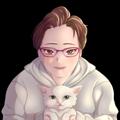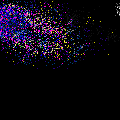She Who Became the Sun is a historical fantasy duology, retelling the rise of the first emperor of the Ming dynasty. This is a reread for me before I get to the sequel for a belated #SFFBookClub sequel month.
My favorite part of this first book is the ways that the major characters all uniquely grapple with their own gendered otherness:
Ouyang is an enslaved warrior eunuch working for the Mongol prince of Henan's son, Esen. Ouyang is the most masculine of characters, but copes with his otherness through anger and shame. He so strongly denies the femininity that other people project onto him that he extrudes that rejection into misogyny. His relationship with men is similarly uneasy and hits a classic trans refrain: "he had no idea if it was a yearning for or a yearning to be, and the equal impossibility of each of those hurt beyond belief". For Ouyang, "the worst punishment is being left alive".
Zhu (the titular sun-becomer) is a famine survivor who decides to claim the great fate of her dead brother by becoming him. Her burning desire for greatness forces her to overcome impossibility through ingenuity. To Zhu, gender and otherness are not a source of shame or a limitation, they are merely tools to work towards greatness or obstacles to work around. She's a delightful contrast with both Ma and Ouyang; her direct contradiction of Ouyang is such a good character and plot moment: "However tired I am, however hard it is: I know I can keep going, because I'm alive."
Wang is the half-Mongolian, adopted brother of Esen. Wang is a scholar out of time, reviled for his effeminate behaviors and unmasculine administrative and accounting interests. Unlike Ouyang, he has no denial or shame about this and accepts ongoing humiliation bitterly; however like Ouyang, he turns this humiliation inward into anger and desire for revenge. Wang is the petty bureaucrat working behind the scenes; even as his work is dismissed, he guides the efforts of his brother Esen from the shadows through funding, diplomacy, and assassination. "In having told yourself so often that I'm worthless, have you forgotten what my domain actually is? I'm an administrator."
Ma is the precious cinnamon roll who keenly feels her own emotions and continually extends love out into the universe to those who don't deserve it, even as it is only returned with suffering. Other than being an extremely endearing character and the caring heart of a novel otherwise filled with selfish desire and denial, she feels like the epitome of self-limited excellence; she is extremely capable but simultaneously trapped by her own inevitable circumstances of being a woman.. "She was a woman and [..]. everything that could be wanted was all equally impossible".
She recognized pragmatism taken to its natural endpoint: the person who climbed according to his desire, with no regard to what he did to get there. Zhu was surprised to feel, instead of sympathetic attraction, a tinge of repulsion.
Parts of this book remind me of The Traitor Baru Cormorant, in particular the resource management of Wang, the political struggles, and the pragmatic way that all of these characters do some occasional horrible things to work towards their own desires (loyalty, revenge, power, greatness).
Both books posit that these desires create suffering (and in an explicitly Buddhist sense here). However, I think Baru is a brutal gutpunch of a book that wants you to believe that sacrifice and suffering is always required (both of the characters and the reader); this book seems to believe in Zhu who can (sometimes) find another path when confronted with an impossibility. Ma also explicitly balances out Zhu's monomaniacal pursuit of greatness and helps Zhu feel some level of revulsion towards pure pragmatism. Together, they are a source of queer joy that creates hope and possibility. These things together make this book work for me and make me able to find love for these complicated characters, while reading Baru left me cold.






